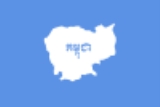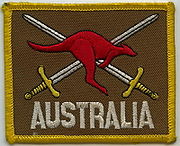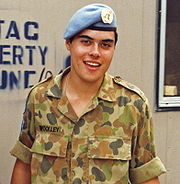
United Nations Transitional Authority in Cambodia
Encyclopedia
The United Nations Transitional Authority in Cambodia (UNTAC) was a United Nations
peacekeeping operation in Cambodia
in 1992–93. It was also the first occasion on which the UN had taken over the administration of an independent state, organized and run an election
(as opposed to monitoring or supervising), had its own radio station and jail
, and been responsible for promoting and safeguarding human rights
at the national level.
in agreement with the State of Cambodia, the de facto government of the country at that time, in order to implement the Paris Peace Accords of October 1991. UNTAC was the product of intense diplomatic activity over many years.
Headed by Yasushi Akashi, with Lieutenant-General John Sanderson
as the head of the Military Component, UNTAC involved 15,900 military, 3,600 civilian police, 2,000 civilians and 450 UN Volunteers, as well as locally recruited staff and interpreters. The whole operation cost over $1.5 billion, mostly in salaries for expatriates.
and Cold War
machinations, to hold free and fair elections leading to a new constitution and to "kick-start" the rehabilitation of the country. It was to exercise 'supervision' or 'supervision or control' over all aspects of government, including foreign affairs, national defence, finance, public security and information, and to supervise, monitor and verify the withdrawal and non-return of foreign military forces; to canton, disarm and demobilize Cambodia's fighting factions, confiscate caches of weapons and military supplies, promote and protect human rights, oversee military security and maintain law and order, repatriate and resettle refugees and displaced persons, assist in mine clearance and the establishment of training programmes in mine clearance and mine awareness, rehabilitate essential infrastructure and assist in economic reconstruction and development.

 Despite UNTAC's boasting of its effectiveness and being feted by the international community as a success, UNTAC failed to disarm
Despite UNTAC's boasting of its effectiveness and being feted by the international community as a success, UNTAC failed to disarm
the Khmer Rouge
, while effectively disarming the SOC's local militias. This bias allowed the Khmer Rouge to make territorial gains and gave rise to political violence. The State of Cambodia's military leaders were furious, claiming that UNTAC was extremely exacting with the disarmament of the CPAF
, but too lenient and ineffective when it came to disarm the Khmer Rouge.
(PDK), whose forces were never actually disarmed or demobilized, barred some people from participating. Prince Ranariddh's FUNCINPEC
Party was the top vote recipient with a 45.5% vote, followed by Hun Sen
's Cambodian People's Party
and the Buddhist Liberal Democratic Party, respectively. FUNCINPEC then entered into a coalition with the other parties that had participated in the election. The parties represented in the 120-member assembly proceeded to draft and approve a new constitution, which was promulgated September 24, 1993. It established a multiparty liberal democracy in the framework of a constitutional monarchy, with the former Prince Sihanouk elevated to King. Prince Ranariddh and Hun Sen became First and Second Prime Ministers, respectively, in the Royal Cambodian Government (RGC). The constitution provides for a wide range of internationally recognized human rights.
had many reservations about the whole UNTAC operation, for the massive presence of foreign troops led in his eyes to the abuse and dishonor of Cambodian women, boosting prostitution
and introducing AIDS
, which led Cambodia to become one of the worst affected countries by AIDS in Asia. The number of prostitutes in the State of Cambodia rose from about 6,000 in 1991, to over 20,000 after the arrival of UNTAC personnel in 1992. By 1995 there were between 50,000 and 90,000 Cambodians affected by AIDS according to a WHO
estimate.
Unfortunately the tribunal began its activity far too late. The first trials of senior Khmer Rouge leaders
took place only in 2007, when many of them were already dead or in ill-health.
Strength: Approximately 22,000 military and civilian personnel
Fatalities: 78 (4 military observers, 41 other military personnel, 14 civilian police, 5 international civilian staff and 14 local staff).
Expenditures: US$
1.62 billion (UNAMIC and UNTAC combined)
United Nations
The United Nations is an international organization whose stated aims are facilitating cooperation in international law, international security, economic development, social progress, human rights, and achievement of world peace...
peacekeeping operation in Cambodia
Cambodia
Cambodia , officially known as the Kingdom of Cambodia, is a country located in the southern portion of the Indochina Peninsula in Southeast Asia...
in 1992–93. It was also the first occasion on which the UN had taken over the administration of an independent state, organized and run an election
Election
An election is a formal decision-making process by which a population chooses an individual to hold public office. Elections have been the usual mechanism by which modern representative democracy operates since the 17th century. Elections may fill offices in the legislature, sometimes in the...
(as opposed to monitoring or supervising), had its own radio station and jail
Jail
A jail is a short-term detention facility in the United States and Canada.Jail may also refer to:In entertainment:*Jail , a 1966 Malayalam movie*Jail , a 2009 Bollywood movie...
, and been responsible for promoting and safeguarding human rights
Human rights
Human rights are "commonly understood as inalienable fundamental rights to which a person is inherently entitled simply because she or he is a human being." Human rights are thus conceived as universal and egalitarian . These rights may exist as natural rights or as legal rights, in both national...
at the national level.
History
UNTAC was established in February 1992 under United Nations Security Council Resolution 745United Nations Security Council Resolution 745
United Nations Security Council Resolution 745, adopted unanimously on February 28, 1992, after recalling resolutions 668 , 717 , 718 and 728 , the Council, after examining a report by the Secretary-General Boutros Boutros-Ghali on February 19, 1992, authorised the establishment of the United...
in agreement with the State of Cambodia, the de facto government of the country at that time, in order to implement the Paris Peace Accords of October 1991. UNTAC was the product of intense diplomatic activity over many years.
Headed by Yasushi Akashi, with Lieutenant-General John Sanderson
John Sanderson
Lieutenant General John Murray Sanderson AC is a former Governor of Western Australia and a former Chief of the Australian Army.-Early life:...
as the head of the Military Component, UNTAC involved 15,900 military, 3,600 civilian police, 2,000 civilians and 450 UN Volunteers, as well as locally recruited staff and interpreters. The whole operation cost over $1.5 billion, mostly in salaries for expatriates.
Goals
UNTAC's aim was to restore peace and civil government in a country ruined by decades of civil warCivil war
A civil war is a war between organized groups within the same nation state or republic, or, less commonly, between two countries created from a formerly-united nation state....
and Cold War
Cold War
The Cold War was the continuing state from roughly 1946 to 1991 of political conflict, military tension, proxy wars, and economic competition between the Communist World—primarily the Soviet Union and its satellite states and allies—and the powers of the Western world, primarily the United States...
machinations, to hold free and fair elections leading to a new constitution and to "kick-start" the rehabilitation of the country. It was to exercise 'supervision' or 'supervision or control' over all aspects of government, including foreign affairs, national defence, finance, public security and information, and to supervise, monitor and verify the withdrawal and non-return of foreign military forces; to canton, disarm and demobilize Cambodia's fighting factions, confiscate caches of weapons and military supplies, promote and protect human rights, oversee military security and maintain law and order, repatriate and resettle refugees and displaced persons, assist in mine clearance and the establishment of training programmes in mine clearance and mine awareness, rehabilitate essential infrastructure and assist in economic reconstruction and development.
Disarmament


Disarmament
Disarmament is the act of reducing, limiting, or abolishing weapons. Disarmament generally refers to a country's military or specific type of weaponry. Disarmament is often taken to mean total elimination of weapons of mass destruction, such as nuclear arms...
the Khmer Rouge
Khmer Rouge
The Khmer Rouge literally translated as Red Cambodians was the name given to the followers of the Communist Party of Kampuchea, who were the ruling party in Cambodia from 1975 to 1979, led by Pol Pot, Nuon Chea, Ieng Sary, Son Sen and Khieu Samphan...
, while effectively disarming the SOC's local militias. This bias allowed the Khmer Rouge to make territorial gains and gave rise to political violence. The State of Cambodia's military leaders were furious, claiming that UNTAC was extremely exacting with the disarmament of the CPAF
Kampuchean People's Revolutionary Armed Forces
The Kampuchean People's Revolutionary Armed Forces, or Khmer People's Revolutionary Armed Forces, was the formal title given to the armed forces of the People's Republic of Kampuchea, the de facto government of Cambodia 1979-1990....
, but too lenient and ineffective when it came to disarm the Khmer Rouge.
1993 elections
Over 4 million Cambodians (about 90% of eligible voters) participated in the May 1993 elections, although the Khmer Rouge or Party of Democratic KampucheaParty of Democratic Kampuchea
Party of Democratic Kampuchea was a political party in Cambodia, formed as a continuation of the Communist Party of Kampuchea in December 1981. In the mid-1980s it publicly claimed that its ideology was "democratic socialism," having ostensibly renounced Communism.-History:The dissolution of CPK...
(PDK), whose forces were never actually disarmed or demobilized, barred some people from participating. Prince Ranariddh's FUNCINPEC
Funcinpec
FUNCINPEC is a royalist political party in Cambodia. Before the 2008 election, FUNCINPEC and the Cambodian People's Party formed a coalition government, although FUNCINPEC's significance has decreased steadily since 1998, when it had an equal relationship with the CPP in the coalition.FUNCINPEC is...
Party was the top vote recipient with a 45.5% vote, followed by Hun Sen
Hun Sen
Hun Sen is the current Prime Minister of Cambodia.He has been the sole leader of the Cambodian People's Party , which has governed Cambodia since the Vietnamese-backed overthrow of the Khmer Rouge in 1979...
's Cambodian People's Party
Cambodian People's Party
The Cambodian People's Party is the current ruling party of Cambodia.This party was formerly known as Kampuchean People's Revolutionary Party...
and the Buddhist Liberal Democratic Party, respectively. FUNCINPEC then entered into a coalition with the other parties that had participated in the election. The parties represented in the 120-member assembly proceeded to draft and approve a new constitution, which was promulgated September 24, 1993. It established a multiparty liberal democracy in the framework of a constitutional monarchy, with the former Prince Sihanouk elevated to King. Prince Ranariddh and Hun Sen became First and Second Prime Ministers, respectively, in the Royal Cambodian Government (RGC). The constitution provides for a wide range of internationally recognized human rights.
Effects of UNTAC presence
Norodom SihanoukNorodom Sihanouk
Norodom Sihanouk regular script was the King of Cambodia from 1941 to 1955 and again from 1993 until his semi-retirement and voluntary abdication on 7 October 2004 in favor of his son, the current King Norodom Sihamoni...
had many reservations about the whole UNTAC operation, for the massive presence of foreign troops led in his eyes to the abuse and dishonor of Cambodian women, boosting prostitution
Prostitution
Prostitution is the act or practice of providing sexual services to another person in return for payment. The person who receives payment for sexual services is called a prostitute and the person who receives such services is known by a multitude of terms, including a "john". Prostitution is one of...
and introducing AIDS
AIDS
Acquired immune deficiency syndrome or acquired immunodeficiency syndrome is a disease of the human immune system caused by the human immunodeficiency virus...
, which led Cambodia to become one of the worst affected countries by AIDS in Asia. The number of prostitutes in the State of Cambodia rose from about 6,000 in 1991, to over 20,000 after the arrival of UNTAC personnel in 1992. By 1995 there were between 50,000 and 90,000 Cambodians affected by AIDS according to a WHO
Who
Who may refer to:* Who , an English-language pronoun* who , a Unix command* Who?, one of the Five Ws in journalism- Art and entertainment :* Who? , a 1958 novel by Algis Budrys...
estimate.
Trials of senior Khmer Rouge leaders
On October 4, 2004, the Cambodian National Assembly ratified an agreement with the United Nations on the establishment of a tribunal to try senior leaders responsible for the atrocities committed by the Khmer Rouge. Donor countries have pledged the $43 million international share of the three-year tribunal budget, while the Cambodian government's share of the budget is $13.3 million.Unfortunately the tribunal began its activity far too late. The first trials of senior Khmer Rouge leaders
Extraordinary Chambers in the Courts of Cambodia
The Extraordinary Chambers in the Courts of Cambodia, commonly known as the "Khmer Rouge Tribunal", is a national court established pursuant to an agreement between the Royal Government of Cambodia and the United Nations to try senior members of the Khmer Rouge for serious violations of Cambodian...
took place only in 2007, when many of them were already dead or in ill-health.
Statistics
Duration: March 1992 - September 1993Strength: Approximately 22,000 military and civilian personnel
Fatalities: 78 (4 military observers, 41 other military personnel, 14 civilian police, 5 international civilian staff and 14 local staff).
Expenditures: US$
United States dollar
The United States dollar , also referred to as the American dollar, is the official currency of the United States of America. It is divided into 100 smaller units called cents or pennies....
1.62 billion (UNAMIC and UNTAC combined)
See also
- UN protectorate
- State of Cambodia

